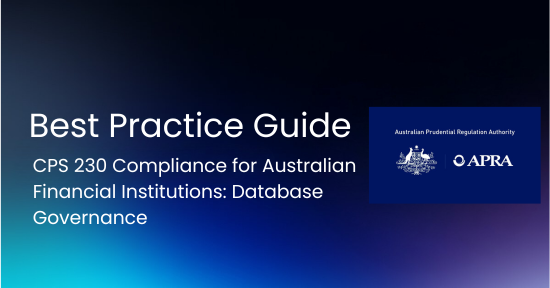CPS 230 Compliance for Australian Financial Institutions: Database Governance Best Practices
Understanding CPS 230 Compliance
CPS 230 is the Australian Prudential Regulation Authority (APRA) prudential standard for operational risk management. It applies to all APRA-regulated entities, including banks, insurers, and superannuation funds. The standard requires these organizations to maintain operational resilience for business continuity.
Effective from July 2025, CPS 230 mandates that entities identify critical operations, establish tolerance levels for disruption, and implement controls to maintain resilience. Boards must provide an annual attestation that operational resilience has been maintained. Non-compliance can result in enforcement action, increased supervisory engagement, and reputational damage.
Key CPS 230 Requirements:
- Identify and map critical operations
- Set tolerance levels for disruption to critical operations
- Implement controls to maintain operations within tolerance
- Test resilience through scenario analysis
- Manage service provider dependencies
- Establish incident management capabilities
- Provide annual board attestation
Database-Specific Requirements and Liquibase Secure Support
1. Critical Operations Identification and Control
Requirement: CPS 230 requires entities to identify critical operations and implement controls to operate within defined tolerance levels. Database systems often support critical operations and require protective controls.
How Liquibase Secure Supports This: Liquibase Secure enforces governance controls for database changes that affect critical operations. Policy Checks validate changes against organizational standards before deployment. Quality gates prevent modifications that could breach tolerance levels. Structured Logging creates audit trails documenting all changes to databases supporting critical operations.
2. Operational Resilience Testing
Requirement: Entities must test their ability to maintain or resume critical operations under severe but plausible disruption scenarios. This includes testing database recovery capabilities.
How Liquibase Secure Supports This: Structured rollback capabilities support testing of database recovery procedures. Version-controlled change history enables validation of restoration processes. Organizations can simulate database failures and test recovery against RTO and RPO targets. Drift Detection identifies configuration discrepancies that could affect resilience testing accuracy.
3. Change Management for Critical Systems
Requirement: Changes to systems supporting critical operations must be assessed for risk, tested, documented, and authorized before implementation.
How Liquibase Secure Supports This: Flows automate change governance workflows, ensuring database changes follow documented procedures. Policy Checks assess risk by validating changes against security and operational standards. Approval workflows enforce authorization requirements. Version-controlled changelogs provide documentation for regulatory reviews.
4. Incident Management and Response
Requirement: CPS 230 requires incident management capabilities to detect, respond to, and recover from disruptions. Organizations must investigate and document incidents affecting critical operations.
How Liquibase Secure Supports This: Drift Detection identifies unauthorized database changes, enabling rapid incident response. Structured Logging supports incident investigation with forensic information about what changed, who authorized changes, and when incidents occurred. Rollback capabilities support rapid recovery from database incidents.
5. Service Provider Management
Requirement: Entities must maintain oversight of service providers whose failure could materially affect critical operations, including technology providers.
How Liquibase Secure Supports This: When database changes involve third-party providers, Structured Logging documents all modifications, providing visibility for service provider oversight. Policy Checks apply to all changes regardless of source, ensuring third-party modifications meet governance standards.
6. Board and Senior Management Attestation
Requirement: CPS 230 requires board approval and annual attestation that operational resilience has been maintained within tolerance levels, supported by documentation and evidence.
How Liquibase Secure Supports This: Observability features enable export of compliance reports, providing evidence for annual attestations. Automated evidence generation demonstrates that database change controls were consistently applied. Complete audit trails show that governance procedures were followed for all database modifications.
Control Objective Matrix
Best Practice Evidence Checklist for Auditors
Liquibase Secure generates exportable evidence to support CPS 230 compliance reviews:
- Change logs showing all modifications to databases supporting critical operations
- Policy enforcement reports demonstrating consistent application of controls
- Approval workflows documenting authorization for changes to critical systems
- Drift detection alerts identifying unauthorized modifications
- Rollback execution logs supporting resilience testing documentation
- Service provider change activity for third-party oversight
- Annual summary reports for board attestation
- Incident response documentation linking database changes to disruptions
Benefits Liquibase Secure Brings to CPS 230 Compliance
Reduced Regulatory Risk
Robust database change governance reduces the likelihood of APRA findings during operational resilience reviews. Proactive controls demonstrate commitment to maintaining critical operations within tolerance levels.
Streamlined Board Reporting
Automated evidence generation simplifies preparation for annual board attestations. Organizations can export reports demonstrating database governance effectiveness throughout the year, reducing manual documentation effort.
Enhanced Operational Resilience
CPS 230 aims to build genuine operational resilience, not just compliance documentation. Liquibase Secure strengthens resilience by preventing risky database changes, enabling rapid recovery, and detecting unauthorized modifications that could disrupt critical operations.
Accelerated Testing Capabilities
Operational resilience testing is resource-intensive. Liquibase Secure's rollback and recovery capabilities make database resilience testing more efficient, allowing organizations to test more scenarios with greater confidence.
Third-Party Risk Mitigation
Australian financial institutions increasingly rely on third-party technology providers. Liquibase Secure extends governance controls to vendor-delivered changes, supporting CPS 230's service provider oversight requirements.
Continuous Audit Readiness
CPS 230 requires ongoing operational resilience maintenance. Liquibase Secure supports continuous compliance through real-time monitoring, automated policy enforcement, and always-available evidence documentation.
CPS 230 in the Context of Australian Financial Regulation
CPS 230 reflects APRA's focus on operational resilience following technology outages in the Australian financial sector. The standard recognizes that digital systems are critical to modern financial institution operations.
Liquibase Secure supports broader Australian regulatory requirements, including:
- CPS 234 Information Security: Database security and access controls
- Prudential Inquiry recommendations: Governance and accountability improvements
- BEAR (Banking Executive Accountability Regime): Senior executive accountability for technology risk
- Privacy Act 1988: Protection of personal information in databases
Integration with Enterprise Risk Management
CPS 230 requires integration of operational risk management into enterprise risk frameworks. Liquibase Secure supports this integration by:
- Providing risk metrics: Quantifiable data about database change risk
- Enabling risk-based decisions: Policy enforcement based on risk assessments
- Supporting risk reporting: Automated reports for risk committees and boards
- Demonstrating control effectiveness: Evidence that risk controls function as intended
Tolerance Levels and Service Level Objectives
CPS 230 requires entities to set tolerance levels for disruption to critical operations. For database systems, this typically includes:
- Maximum tolerable period of disruption (MTPD): Acceptable database unavailability duration
- Recovery time objective (RTO): Target database restoration timeframe
- Recovery point objective (RPO): Acceptable data loss threshold
Liquibase Secure supports these objectives through:
- Rapid, targeted rollback: Fast recovery to known-good database states
- Change validation: Prevention of changes that could cause disruptions
- Drift detection: Identification of issues before they cause outages
Real-World Example: Major Australian Bank
A tier-one Australian bank needed to demonstrate CPS 230 compliance for databases supporting critical payment operations. The bank defined a four-hour RTO and one-hour RPO for payment databases.
The bank implemented Liquibase Secure with the following controls:
- Policy Checks preventing schema changes during business hours
- Flows requiring two-person approval for production payment database changes
- Drift Detection scans payment databases every 15 minutes
- Structured Logging capturing all changes for regulatory review
During annual attestation preparation, the bank exported evidence showing 100% policy compliance for payment database changes. When a third-party provider attempted an unauthorized change, Drift Detection identified the modification within 15 minutes, enabling rapid rollback. The bank documented this incident response for APRA review, demonstrating effective incident management capabilities.
The bank's internal audit team validated that database change controls met CPS 230 requirements, supporting board attestation with minimal manual evidence gathering.
Conclusion
CPS 230 represents a comprehensive approach to operational resilience for Australian financial institutions. Database systems supporting critical operations require robust change management, incident response capabilities, and resilience testing.
Liquibase Secure embeds CPS 230 requirements into database delivery workflows, enabling organizations to meet regulatory obligations while building genuine operational resilience. By treating database change as a critical control point, Australian financial institutions can maintain critical operations within tolerance levels while continuing digital innovation.
Ready to achieve CPS 230 compliance while strengthening operational resilience? Learn how Liquibase Secure provides the governance, testing, and recovery capabilities Australian financial institutions need.










